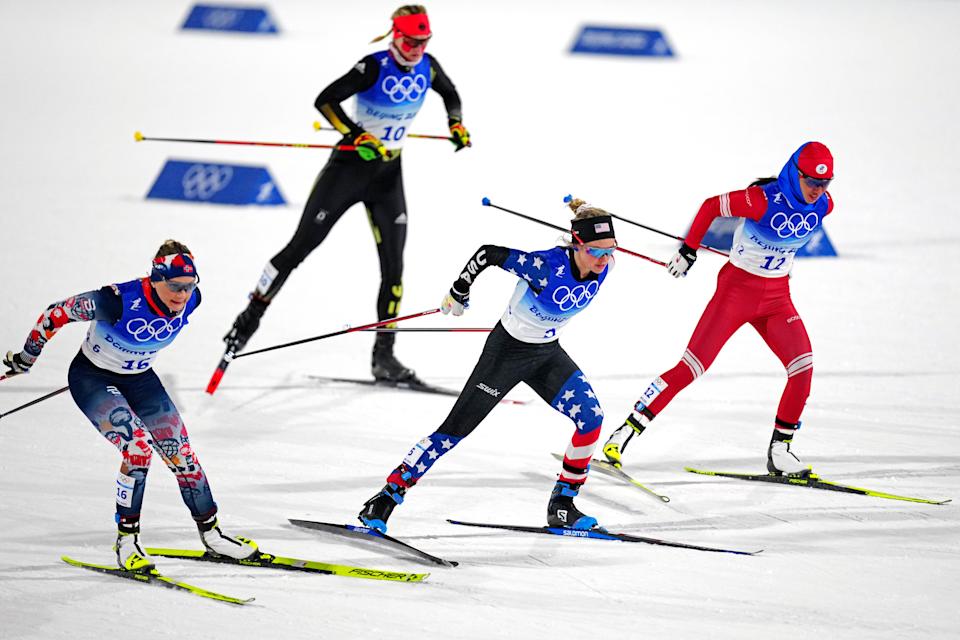A Yankee Notebook
NUMBER 2116
February 7, 2022
Title IX
EAST MONTPELIER, VT – No person in the United States shall, on the basis of sex, be excluded from participation in, be denied the benefits of, or be subjected to discrimination under any education program or activity receiving Federal financial assistance. – Title IX of the Education Amendments of 1972.
I’ve been watching bits of the Olympics now and then. To be honest, I haven’t watched any sports at all to speak of since the first whiffs of performance-enhancing drugs entered the atmosphere. Baseball, track and field, football, and cycling, among many others, have largely lost their luster, and thus their interest in my eyes. When winning becomes more important than winning honestly, the sport disappears. This doesn’t mean that I believe any of the competitors in the current Games are using banned substances. The detection protocols are better than ever, and the penalties for infractions severe. The theologian William Temple once remarked, “I think myself as honest as any man. But I’m comforted to know that the conductor will come ‘round for my ticket.” Me, I’m just I’m tired of the cat-and-mouse game of ensuring “clean” competition.
And yet there’s good news. My son mentioned it the other night during one of our twice-weekly Zoom chats. He noted how many women were competing in sports long considered too strenuous or dangerous for them, and suggested this was the result of Title IX.
First signed into law fifty years ago by then-President Nixon and tweaked and challenged many times since then, Title IX has primarily guaranteed equal support of women’s athletics in any institution receiving federal support, no matter how indirectly. The results are obvious to anyone watching speed skating, biathlon, or cross-country skiing. Many of us remember when the only outliers who attracted attention in the Olympics were members of ethnic or racial minorities – Jesse Owens and Jim Thorpe spring to mind – or religious – remember Chariots of Fire?
I’m not sure it occurred to any of us following that drama of mid-century athletic competition that about half the world’s population was unrepresented. The buckboard of progress, inevitable as its advance may be, rumbles slowly and erratically forward, carrying some and forcing others to walk. I’ll probably always remember a line from the film, The Go-Between, when the young courier is blaming the woman (Julie Christie) engaged in an illicit romance for its tragic end. “Leo,” the older man says, “nothing is ever a woman’s fault.”
The corollary to that notion – that nothing is ever a woman’s responsibility – by extension, denies her right to independence. Fewer of us all the time remember now that our wives (my wife and I were married in 1959) once couldn’t open bank or charge accounts without a husband’s cosignature. “The little woman” was a common sobriquet for wife. To be called a “woman driver” was an intended insult – still is, as a matter of fact. Women were prohibited (by serious-faced men clearly concerned for their health) from competing in, for example, track and field events, ski jumping, and endurance events because, it was alleged, their reproductive organs would be damaged, or even fall out. How Neanderthal all that sounds now!
To see Jessie Diggins or Kikkan Randall giving all they have in the last meters of a gold-medal finish can bring tears to your eyes. The women in skin-tight suits wearing long blades on their feet – you just wonder how anybody can go that fast, surrounded by knives, and think strategically at the same time. The women biathletes are equally awesome. And watching the 15-year-old Russian figure skating phenomenon, Kamila Valieva, land a quadruple Salchow, you think, “That can’t be done! But wait. She just did it again – a quad toe loop!” Will wonders never cease?
We hope not. Almost half of this winter’s Olympic athletes (45%) are women, the highest percentage ever. The Olympic Committee’s goal is parity only two years from now, at the Summer Olympics in Paris. Shakespeare might call that a consummation devoutly to be wished.
The United States’ laws, like the aforementioned chariot of progress, often lumber forward well behind the needs of its citizens, rather like a frog uncertain whether it wants to get somewhere else – or, for that matter, like evolution. The Civil Rights Act of 1964, for all the gnashing of teeth it’s caused in some quarters, was one of those leaps; and Title IX one of its most consequential legal experiments. How lucky we’ve been to be able to see its most prominent results – so far.


